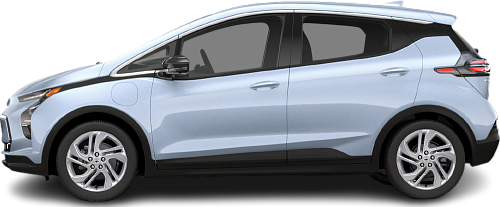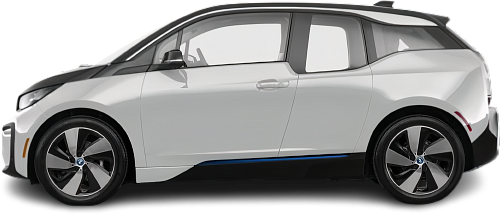Chevrolet Bolt EV Gen 3 vs BMW i3 BEV 60 Ah
Struggling to Decide? Let AI Help!
Your AI Summary Is Ready!
General Info
Since both vehicles have been discontinued, they are now only available on the used car market. You can get the Chevrolet Bolt EV Gen 3 (2022-2023) for as low as $9640, while the BMW i3 BEV 60 Ah (2013-2017) begins at $4500.
The two vehicles share the same body style: Hatchback.
| Property | Chevrolet Bolt EV Gen 3 | BMW i3 BEV 60 Ah |
|---|---|---|
| Years of Production | 2022-2023 | 2013-2017 |
| Current Status | Discontinued | Discontinued |
| Country of Manufacture | USA | Germany |
| Body Style | Hatchback | Hatchback |
| Market Availability | USA | EU, USA |
| Price USA (Used) | $9640 | $4500 |
| GCC Score | 5.7 | 4.9 |
Range and Efficiency
While the Chevrolet Bolt EV Gen 3 (2022-2023) offers a longer real-world range and a bigger battery, it is less energy-efficient than the BMW i3 BEV 60 Ah (2013-2017).
| Property | Chevrolet Bolt EV Gen 3 | BMW i3 BEV 60 Ah |
|---|---|---|
| Range (EPA) | 259 mi | 81 mi |
| Range (GCC) | 246 mi | 83 mi |
| Battery Capacity (Nominal) | 65 kWh | 21.6 kWh |
| Battery Capacity (Usable) | 61.8 kWh | 18.8 kWh |
| Efficiency per 100 mi | 25.1 kWh/100 mi | 22.7 kWh/100 mi |
| Efficiency per kWh | 3.98 mi/kWh | 4.41 mi/kWh |
| Range and Efficiency Score | 7.6 | 5.8 |
Charging
Both vehicles utilize a standard 400-volt architecture.
The Chevrolet Bolt EV Gen 3 (2022-2023) offers faster charging speeds at DC stations, reaching up to 55 kW, while the BMW i3 BEV 60 Ah (2013-2017) maxes out at 50 kW.
The Chevrolet Bolt EV Gen 3 (2022-2023) features a more powerful on-board charger, supporting a maximum AC charging power of 11.5 kW, whereas the BMW i3 BEV 60 Ah (2013-2017) is limited to 7.4 kW.
| Property | Chevrolet Bolt EV Gen 3 | BMW i3 BEV 60 Ah |
|---|---|---|
| Max Charging Power (AC) | 11.5 kW | 7.4 kW |
| Max Charging Power (DC) | 55 kW | 50 kW |
| Architecture | 400 V | 400 V |
| Charge Port | CCS Type 1 | CCS Type 1 |
| Charging Score | 6 | 3.8 |
Performance
The BMW i3 BEV 60 Ah (2013-2017) is rear-wheel drive, while the Chevrolet Bolt EV Gen 3 (2022-2023) offers a front-wheel drive system.
The Chevrolet Bolt EV Gen 3 (2022-2023) boasts greater motor power and accelerates faster from 0 to 60 mph.
| Property | Chevrolet Bolt EV Gen 3 | BMW i3 BEV 60 Ah |
|---|---|---|
| Drive Type | FWD | RWD |
| Motor Type | PMSM | PMSM |
| Motor Power (kW) | 150 kW | 125 kW |
| Motor Power (hp) | 201 hp | 168 hp |
| Motor Torque | 266 lb-ft | 184 lb-ft |
| 0-60 mph | 6.5 s | 7 s |
| Top Speed | 91 mph | 93 mph |
| Performance Score | 3.6 | 3.2 |
Dimensions
The Chevrolet Bolt EV Gen 3 (2022-2023) is longer and taller, but about the same width as the BMW i3 BEV 60 Ah (2013-2017).
Both models have similar wheelbase lengths.
| Property | Chevrolet Bolt EV Gen 3 | BMW i3 BEV 60 Ah |
|---|---|---|
| Length | 163.2 in | 157.4 in |
| Width (with Mirrors) | 80.3 in | 80.3 in |
| Width (w/o Mirrors) | 69.5 in | 69.9 in |
| Height | 63.4 in | 62.1 in |
| Wheelbase | 102.4 in | 101.2 in |
Cargo and Towing
The Chevrolet Bolt EV Gen 3 (2022-2023) provides more cargo capacity, featuring both a larger trunk and more space with the rear seats folded.
Neither car is equipped with a frunk (front trunk).
Neither vehicle is officially rated for towing in the US.
| Property | Chevrolet Bolt EV Gen 3 | BMW i3 BEV 60 Ah |
|---|---|---|
| Number of Seats | 5 | 4 |
| Curb Weight | 3589 lb | 2866 lb |
| Cargo Volume (Trunk) | 16.6 ft3 | 9.2 ft3 |
| Cargo Volume (Max) | 57 ft3 | 38.8 ft3 |
| Cargo Volume (Frunk) | - Cargo Volume (Frunk) | - Cargo Volume (Frunk) |
| Towing Capacity | - Towing Capacity | - Towing Capacity |
| Cargo and Towing Score | 4.8 | 4.2 |




